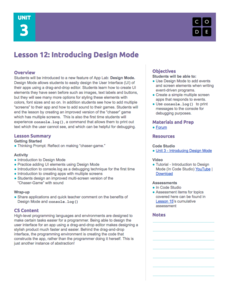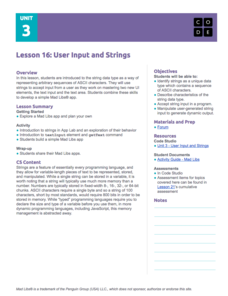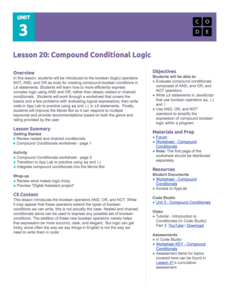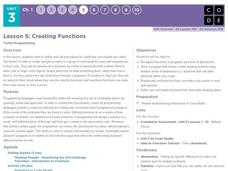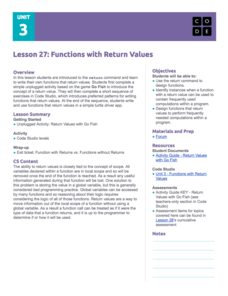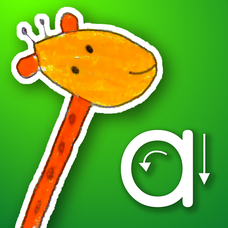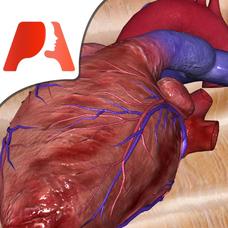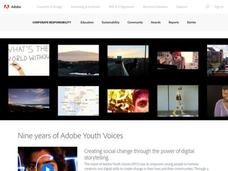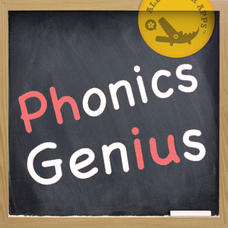Center for Open Educational Resources and Language Learning
Reading Activity
Ready to integrate technology into your ELL instruction? Check out this reading lesson plan that has language learners using the Internet and apps, joining online book clubs, and creating blogs. A fine model of what can be done.
Code.org
Introducing Design Mode
Move beyond buttons when designing user interfaces. In the fourth installment of a 21-part unit, young computer scientists learn to apply design mode, which gives users options for colors, fonts, etc. They learn to incorporate these...
Code.org
User Input and Strings
Pupils learn to apply strings in computer science. They master two new user interface elements and also use string type data to represent ASCII characters. Finally, individuals create an app for Mad Libs in the eighth activity of the...
Code.org
The Cost of "Free"
Explore the trade-offs of using a free app. The fourth installment of a 12-part unit helps young consumers discover the cost of receiving a free service. They learn how these apps make use of their access to data.
Philadelphia Museum of Art
Physics at the Art Museum: Kinetic Energy, Potential Energy, and Work
Connect science, math, and art for a true interdisciplinary lesson! Learners explore simple machines in art. Through analysis with a physics app, they identify positions of kinetic and potential energy and make conclusions about work.
Code.org
APIs and Using Functions with Parameters
Introduce your class to the API, a reference guide that lists and explains the functionality of programming language. Using JavaScript, individuals draw complex designs that require additional commands and parameters defined in the...
Code.org
Compound Conditional Logic
Scholars explore compound conditional logic and learn to use the Boolean operators AND, OR, and NOT within conditional statements by incorporating these operators to improve a previously created app.
Code.org
Creating Functions
Quit repeating yourself ... you can make this simpler! Rather than repeating the same set of code over and over, class members learn to build and call functions in a series of challenges in App Lab. In the end, they combine...
Code.org
Functions with Return Values
Young computer scientists explore how to use the return command in computer programing by playing Go Fish. They learn about functions that return values and then write a turtle driver app using the return function.
Illustrative Mathematics
Identifying Exponential Functions
Class members have the opportunity to quickly change the variables of an exponential graphs through the use of sliders on Desmos. Four graphs are given and young mathematicians, through the use of the graphing app, can discover which...
Curated OER
What is my Angle? App
Learners estimate angle measures in this this estimating angle measures activity. They use an application on their graphing calculator that shows various settings involving angles and then they estimate the angle measure of a clock's...
Oleh Yudin
iCrosss
Did you know that a soccer ball is very similar to a truncated icosahedron? Both have 32 faces, but while a truncated icosahedron is made up solely of flat hexagons, a traditional soccer ball has 12 pentagons and 20 hexagons, each curved...
Roy Winata
iWriteWords (Handwriting Game)
Give me a W! Give me an O! Give me a W! What does it spell? Wow! Teach youngsters how to write letters and numbers with colorful tracing activities that include encouraging audio and make writing enjoyable. Soon, they will be writing...
Mind Snacks
SAT Vocab - MindSnacks
Who knew learning and practicing vocabulary for the SAT could be this absorbing? With 500 words to learn after an upgrade, and nine different games for practice, users are sure to feel prepared on testing day!
Mind Snacks
Learn Japanese - MindSnacks
Japanese is at your fingertips! Japanese language learners will get a kick out of the eight games and specially designed Japanese materials provided here.
21 x 20 Media
A+ Writing Prompts
Shake it up! Shake your tablet to bring up a unique writing prompt for journaling or blogging with your class. Shake again and a new one appears. Prompts can come from different categories (sketches, scenes, texts, words, news) to help...
Mind Snacks
Learn Chinese (Mandarin) - MindSnacks
Acquire over 1000 Chinese words while playing games! Mandarin Chinese, one of the most desired languages in business and technology, is the focus of this teaching tool. Users will pick up vocabulary and practice tones, all while tapping...
GP Strategies Corporation
Frog Dissection
One of the most common questions in a science classroom is, "Do we get to dissect anything?" With a fun and interactive experience, your eager biologists can perform a virtual dissection on a frog, as well as learn about different kinds...
Pocket Anatomy
Pocket Heart
An all-encompassing, fully interactive, gorgeously animated model of the heart can be used to teach cardiac anatomy, physiology, and even a touch of epidemiology.
Quizlet
Quizlet
Bring your class's study skills into the 21st century with this digital teaching tool. Offering an easy way to create and share customized sets of flash cards with students, parents, and other educators, this resource is a...
Tinybop
The Human Body
Examine the systems of the human body with a bold, charming, and kid-friendly application. This noteworthy tool is certain to get kids interested what goes on inside of them! The eye feature uses the tablet camera to view images and show...
Vosonos
Interactive Minds: Solar System
Travel through space as you learn about the galaxy, solar system, planets, and much more. An extensive resource for studying astronomy in upper-elementary and middle school classrooms.
Innovative Mobile Apps
Phonics Genius
Readers at any level who are practicing phonics will benefit from a highly customizable set of features designed for instruction and practice. The extensive library of phonemes and exemplar words covers sounds from the a in cat...
Tiny Mobile
Poetry Creator | Verses
Construct from a canvas of words, lyrical expressions that your budding poets can share and post. Based on refrigerator magnet poetry, creative writers can develop their poetry independently, or from a given prompt from their...
Other popular searches
- Apps Americana
- App Rover
- Ipod Touch Apps
- Apps Ca Ecus Famous Quote
- Maria Con Tr App
- Pod Touch Apps
- Maria Von Tr App

